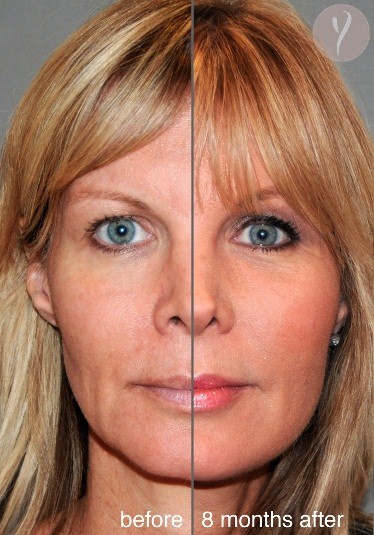Botox (brand name) is a toxin, which has medical applications when injected in small amounts. It is produced by bacteria called Clostridium botulinum, and when present in ingested food, can cause food poisoning. Botulism can cause serious paralysis, but when Botox is applied medically to weaken muscles, it can have very useful effects. The toxin, called botulinum, is also available in other brand names such as Vistabel and Xeomin.
What Is Botox?
Botox is an FDA-approved drug that consists of a neurotoxin called botulinum. It is produced  by bacteria known as Clostridium botulinum. This toxin is used medically as treatment for certain medical conditions, although it is more popularly used to remove wrinkles by causing temporary paralysis of facial muscles.
by bacteria known as Clostridium botulinum. This toxin is used medically as treatment for certain medical conditions, although it is more popularly used to remove wrinkles by causing temporary paralysis of facial muscles.
Other commercially known brands of botulinum toxin include Vistabel, Dysport, Xeomin, Bocouture, and Myobloc.
What Are the Uses of Botox?
Medical Use
A lot of research has been done on the medical uses of Botox, and it has been found to be effective in treating conditions such as:
- Spasm (or contraction) of the eyelids (blepharospasm)
- Severe spasms of the neck and shoulder muscles
- Chronic headaches (migraines)
- Excessive sweating (hyperhidrosis)
- Crossed eyes (strabismus)
- Spasm of the arms (after a stroke)
- Urinary incontinence
- Overactive bladder
- Spasm of one side of the face
Cosmetic Use
- Frown lines between the eyebrows (glabellar lines)
- Crow's feet (lines in the outer eye)
- Other facial lines and wrinkles
How Does a Botox Injection Work?
How to Prepare
Most people can tolerate Botox injections with little discomfort, but you may prefer to have your skin numbed before the procedure. Your options include:
- Injecting a numbing drug into the skin
- Applying a prescription cream directly to the skin at least an hour before the procedure, or
- Blasting very cold air directly on the skin for about ten seconds, which results in a few seconds of numbness.
What Happens in the Process
The procedure is done in your doctor's office. The doctor injects a small amount of botulinum toxin using a thin needle into your skin and/or muscles. Depending on some factors, such as the area involved, the number of Botox injections may vary.
What to Expect Afterwards
You can expect that you will be able to resume normal activities right after the treatment. You must take care, however, not to massage or rub the areas that were treated to prevent the toxin from migrating to other areas.
Botox injections usually begin showing their effects a few days after the treatment. The effects of Botox injections are temporary. It may last between 3 to 12 months, depending on the type of problem that was treated. Symptoms of your original condition may return within three months after treatment. Furthermore, it may take less time for your symptoms to return after repeated injections because your body may develop antibodies to counteract the effects of botulinum toxin. So you will need regular injections at follow-up to maintain the effects.
Try not to get Botox injections from different doctors at a time. If you do switch doctors, make sure to tell the new provider when you had your last Botox injection.
Using Botox too often than what is usually prescribed will not give better effects, but may lead to serious side effects.
The procedure of giving Botox can be seen in this the link:
What Are the Side Effects & Risks of Botox?
Common side effects from Botox injections include:
- Muscle weakness near the area injected
- Bleeding, bruising, pain, swelling and redness on the site of injection
- Headaches
- Muscle stiffness
- Pain in neck, back, arms or legs
- Increased sweating in other areas besides the underarms
- Cold or flu symptoms (sneezing, stuffy nose, cough, sore throat)
One can get an allergic reaction to Botox, and if these symptoms occur, get help immediately:
- Hives
- Difficulty breathing
- Feeling faint
- Swelling of the face, tongue, lips, or throat
Another side effect may result from the toxin spreading to other areas beyond the injection site. This may cause serious life-threatening effects, even if treatment was only for cosmetic purposes. Symptoms may occur several hours or weeks after the injection, so call your doctor immediately if you experience these side effects:
- Severe or unusual muscle weakness in another body area not injected with Botox
- Trouble talking, swallowing, or breathing
- Drooping eyelids
- Hoarse voice
- Loss of control of urination
- Eyelid swelling
- Crusting, drainage from eyes
- Vision problems
- Pain when urinating
- Little or no urination
- Chest pains
- Irregular heartbeats
Watch the video and make sure that your Botox is used legally and safely:
